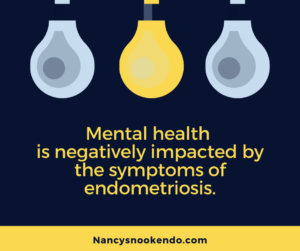
It comes as no surprise to those of us who suffer from endometriosis and/or any related conditions that it can affect our mental health and well-being. Just as our bodies need proper care, so do our minds and emotions. Seeking help is not a sign of weakness, and it is not a sign that it is “all in your head”. Seeking help when needed is just another step on your path to feeling better.
Symptoms from endometriosis, such as pain and fatigue, can impact an individual’s quality of life significantly. This can affect our mental health. Some studies have indicated that symptoms like chronic pelvic pain can increase the symptoms of depression and anxiety (Lagana et al., 2017). Proper treatment for the underlying cause of symptoms can help, but years of symptoms, such as pain or infertility, can create a toll. Utilizing mental health resources can help. In addition, do not think when a provider suggests an antidepressant that they think it’s “all in your head”. Depression and anxiety can be impacted by any chronic illness. In addition, serotonin and norepinephrine (chemicals in the brain), which antidepressant medications affect, are implicated in pain as well as mood.
Studies
- Laganà, A. S., La Rosa, V. L., Rapisarda, A. M. C., Valenti, G., Sapia, F., Chiofalo, B., … & Vitale, S. G. (2017). Anxiety and depression in patients with endometriosis: impact and management challenges. International journal of women’s health, 9, 323. Retrieved from https://www.ncbi.nlm.nih.gov/pmc/articles/PMC5440042/
“Symptoms of endometriosis often affect psychological and social functioning of patients. For this reason, endometriosis is considered as a disabling condition that may significantly compromise social relationships, sexuality and mental health. Considering this point, the aim of this narrative review is to elucidate the impact of anxiety and depression in the management of women with endometriosis. Psychological factors have an important role in determining the severity of symptoms, and women who suffer from endometriosis report high levels of anxiety, depression and other psychiatric disorders. In addition, endometriosis is one of the most important causes of CPP; women with endometriosis suffer from a wide range of pelvic pain such as dysmenorrhea, dyspareunia, nonmenstrual (chronic) pelvic pain, pain at ovulation, dyschezia and dysuria. Several studies have underlined the influence of CPP on quality of life and psychological well-being of women with endometriosis. Data suggest that the experience of pelvic pain is an important component of endometriosis and may significantly affect emotive functioning of affected women….The main purpose of treatments should be pain control, improvement of the quality of life, prevention of disease recurrence, fertility preservation and reduction of anatomical damage….According to recent data, women with endometriosis are at risk for anxiety, depressive symptoms and other psychiatric disorders. Since it is still unclear if these comorbidities are a result of endometriosis itself or other factors such as CPP, we solicit further studies about this topic in order to better understand the relationship between endometriosis and psychological diseases. In addition, we take the opportunity to stress the importance of a multidisciplinary approach in the management of women with endometriosis. In this regard, psychological assessment is recommended in order to identify women at risk of developing symptoms of anxiety and depression and provide them an adequate psychological support. The aim should be to reduce as much as possible the impact of endometriosis on quality of life and psychological well-being of these patients.”
- Donatti, L., Ramos, D. G., Andres, M. D. P., Passman, L. J., & Podgaec, S. (2017). Patients with endometriosis using positive coping strategies have less depression, stress and pelvic pain. Einstein (São Paulo), 15(1), 65-70. Retrieved from https://www.ncbi.nlm.nih.gov/pmc/articles/PMC5433310/
“Studies approaching psychological perspective of endometriosis deal with issues such as patients’ poor quality of life,10,14,16-18 including harms in interpersonal and affective relationships;6,16 difficulties in sexuality;9,19professional losses;10,11depression and anxiety;3,7,20 suffering facing the recognition of healing difficulties;21ways for facing the disease;4constant presence of pain and stress;4,5,22,23 importance of therapy and group support;3,5,12-14and other complementary therapies in which the objetive is to reduce pain and anxiety, such as acunputure and relaxing techniques,24,25 exercises26 and changes in eating habits.1 To understand life of patients with endometriosis and comprehend their coping strategies seem to be initial of an important pathway to develop a more comprehensive treatment and provide resources for future interventions….
“Our study confirmed the importance of treating endometriosis in terms of a psychosomatic point of view, because its symptoms affect the patient in physical and emotional levels as well, as we proved by the association among studied variables. The endometriosis is a disease of multiple facets and influence life of patients in a number of levels, therefore it should be treated in this same dimension.
“Conclusion: We observed an association between coping strategy, depression, type and levels of stress, pain intensity in patients with endometriosis. Therefore, clinical treatment of the disease should include the psychic approach of symptom with intervention based in coping strategies theory and reduction of stress, thus contributing to reduce depression and symptoms related to endometriosis.”
Links:
- “Coping with endometriosis“
- “Endometriosis: improving the wellbeing of couples”
- “7 Stages Of Grief – Going Through the Process and Back to Life”
- “A Letter to Patients with Chronic Disease”
- “The Holmes-Rahe Stress Inventory”
- National Suicide Prevention Hotline: 1-800-273-8255
